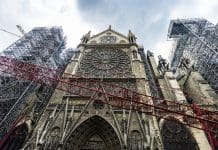Architects are calling for urgent building inspections after concerns were raised about building standards following major latent defects at Edinburgh schools
Leading architects in Scotland have called for urgent building inspections to be undertaken after defects were found at a number of schools across Edinburgh.
This would apply to all public buildings constructed in the 21st century, which would need to be checked for major latent defects that could be make the structures unsound.
The appeal was launched in response to the publication of a report into the Edinburgh schools scandal, which saw 17 buildings brought under the spotlight after it emerged construction work had not been properly signed off.
Risking lives
Professional body the Royal Incorporation of Architects in Scotland (RIAS) said lives could be at risk due to shortcomings with the self-certification of these buildings.
The situation was brought to light last January after a wall collapsed at a primary school in Edinburgh. Following this a total of 17 schools were found to have structural issues that led to their closure.
The Edinburgh Schools Partnership (ESP) built the schools during the first round of a public-private partnership (PPP) in 2005. The deal formed part of a £360m private finance agreement, which saw 13 schools built in a joint venture between Miller Construction and Amey, and the second phase by Miller, which was taken over by Galliford Try in 2014.
Now, a new report by John Coles, an architect and procurement expert, has revealed these issues could also exist in other publicly-funded developments across the country.
Pursing profit, not safety
RIAS chief executive Neil Baxter said there had been too much focus on pursing profit and not safety by contractors and developers on these projects. He also called for the recommendations of the report to be acted upon.
He said: “If we don’t act on this report, there is a good chance people will die.”
Baxter added: “In contracts where there is too much emphasis on cost saving, there have been a number of occasions when architects have reported concerns relating to specific building safety and building quality issues.
“The system effectively builds in a conflict of interest: the contractor has an interest in terms of ensuring his shareholders are well served by profit, so he minimises cost.
“This may well be against the long-term interest of the client, the public, the users. This is simply not the best system.”
RIAS President Willie Watt said there was no time to sit back on the heels of this report.
“When major inquiry reports are published there is a tendency for everyone to breathe a sigh of relief, mutter ‘well that’s that dealt with’ and move on,” he said.
“That should not be the case with this, extremely well researched and deeply concerning report. The message is simple and the responsibility of all commissioning authorities is clear.
“An early process of inspection by appropriately qualified experts should proceed as urgently as the various public commissioning authorities, local, health and governmental, can muster the skilled individuals who can do this work.
“The Royal Incorporation’s own submission to the Inquiry agreed strongly that without diligent and careful checking at every stage of the building process problems are almost inevitable. In this instance it was fortunate that nobody was injured, or killed.”
A spokesperson for the Scottish government said: “The safety of people in public buildings is an absolute priority. That is why the housing minister has written to all local authorities highlighting the issues and recommendations the Cole Report raises.”
Inquiry into private finance models needed
An inquiry into the use of private finance models to build schools and public facilities in Scotland has been called for by union Unite. The organisation said there was a need to discover if these types of contracts deliver safety as well as value for money. It should also look at contracts carried out under the Scottish government’s NPD model and previous PFI/PPP models.
Unite deputy Scottish secretary, Mary Alexander, said local authorities are being “held at gun point” to use private finance models.
“It’s no surprise to us that the report finds that using private finance increases the risk of poor quality design and construction,” she said.
“But it is absolutely shocking to find the report say that the Edinburgh scheme was ‘quite typical’ in this regard.
“A wall collapsed and people could have died. Other schools in Edinburgh were found to be substandard. If Edinburgh was ‘typical’ then we need a national inquiry to look at every building that was constructed under a private finance model so that the public can be assured they are safe and fit for purpose.
“Private finance is delivering poor quality at extortionate cost, putting massive debt around the necks of councils, health boards and other public bodies, and dragging them under at a time of austerity. The use of private finance models should be scrapped now.”









![[VIDEO]What to expect when you’re inspecting: Using DorTrak for fire door inspections](https://www.pbctoday.co.uk/news/wp-content/uploads/2025/02/maxresdefault-218x150.jpg)



